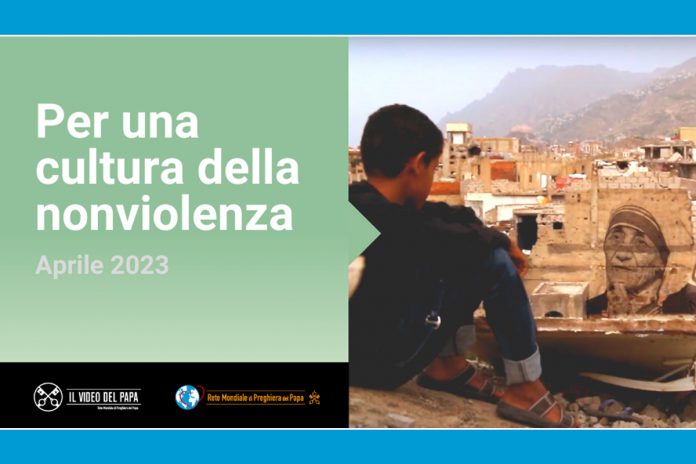Vatican City. The Pope’s video for the month of April 2023, with the prayer intention the Holy Father entrusts to the Catholic Church through the Pope’s World Prayer Network, is “for a non-violent culture”.
” Living, speaking, and acting without violence is not surrendering, losing or giving up anything, but aspiring to everything. As Saint John XXIII said 60 years ago in his Encyclical Pacem in Terris, war is madness. It’s beyond reason. Any war, any armed confrontation, always ends in defeat for all. Let us develop a culture of peace. Let us remember that, even in cases of self-defense, peace is the ultimate goal, and that a lasting peace can exist only without weapons. Let us make non-violence a guide for our actions, both in daily life and in international relations. And let us pray for a more widespread culture of non-violence, that will progress when countries and citizens alike resort less and less to the use of arms” – are Pope Francis’ words.
As the initiative’s Press Release recalls, April 11 marks the 60th anniversary of the publication of the encyclical Pacem in terris written by Pope John XXIII and subtitled “On establishing universal peace in truth, justice, charity, and liberty.” In this month’s video, Francis strongly renews this message, stressing that “war is madness, it is beyond reason”.
This quote from sixty years ago, cited by Francis in the message accompanying his prayer intention, is more relevant than ever, as are the testimonies left by some of the people who sowed seeds of peace in the last century: St. John XXIII, of course, but also Mahatma Gandhi, Martin Luther King, St. Teresa of Calcutta. In The Pope Video this month, their black-and-white portraits appear amid the scenes of destruction caused by today’s violence: from the war in Ukraine to armed conflicts in the Middle East, to the clashes and shootings in even the wealthiest countries. Although there has been no shortage of witnesses, in the end, the world has not yet learned the fundamental lesson: that “Any war, any armed confrontation, always ends in defeat for all”.
The only possible way to stop this onslaught is to seek and implement, at the local and international level, ways of real dialogue and to assume “non-violence” as “a guide for our actions”. This message echoes what Pope John XXIII said 60 years ago: violence “has always destroyed everything. It has inflamed passions, but never assuaged them. It sows no seeds but those of hatred and destruction. Far from bringing about the reconciliation of contending parties, it reduces men and political parties to the necessity of laboriously redoing the work of the past, building on the ruins that disharmony has left in its wake”.
At a time in history marked by the conflict in Ukraine, which has involved a large number of countries over the past year, Francis recalls that, even in cases of self-defense, the ultimate goal must always be peace: even when this peace, as today, seems distant. But “a lasting peace —he adds— can exist only without weapons”, and for this reason he insists on a matter dear to his heart: the disarmament at all levels, including within society: “the culture of non-violence will progress when countries and citizens alike resort less and less to the use of arms”.




















